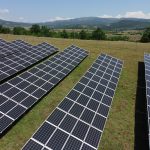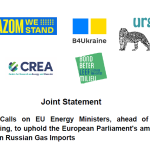
Final decision on EU Energy Efficiency: Policymakers settle for meagre mediocrity rather than meaningful efficiency
- A disappointing decision from the final trilogue that fails to recognise the urgent action needed to address the current ‘trilemma’ that Europe now faces.
- The final agreement between the EU Commission, Parliament and Council lacks ambition and now the ball is in Member States’ court to raise the ambition for their National and Energy Climate Plans later this year.
Brussels, 10th March – In the early hours of this morning, EU co-legislators came to a disappointing final decision on the Energy Efficiency Directive (EED), the legislative backbone for increasing energy savings across Europe and weaning off fossil fuels. This agreement fails to recognise the current ‘trilemma’ the EU finds itself in. Reducing our energy consumption and dependency on fossil fuels is one of the key solutions in addressing the cost of living crisis, the EU’s energy insecurity and the climate emergency.
Yet, the 11.7% 2030 energy efficiency target now set by policymakers in the directive does not even align with the REPowerEU Plan, failing to recognise the skyrocketing energy prices as a result of Russia’s aggression in Ukraine. It is far below the 20% energy efficiency target that is needed for the EU to fulfil its obligations under the Paris Agreement. Moreover, there are no national binding contributions to hold member states accountable and the binding primary energy target was scrapped, which disincentives the development of efficient energy systems and infrastructure, as well as renewable energy. The agreed upon energy savings obligation’s rate is lower than what the European Commission had proposed and is a stepwise approach of an 1.49 % average over the period, instead of the 2% demanded by the climate NGOs.
However, some progress has been made compared to the EED that is currently in place. It is the first time that policymakers agree to have a binding final energy consumption target, which is a milestone. Another rather positive step is that there are now gap filling mechanisms for the target, which can help make sure that national contributions add up to the binding target for final energy.
Yet, the urgency for the EU to wean off fossil fuels is overall not reflected in the final agreement. The exclusion of fossil fuels from the energy savings obligation as per the EU Commission’s original proposal has been made weaker. The only remaining strongpoint is the exclusion of fossil fuels for residential buildings, which should produce a positive spillover for the EPBD and the Ecodesign regulation.
“Despite mounting evidence on the harm that fossil fuels are having on the climate, people and our future, policymakers fall short once more on increasing Europe’s energy savings and taking a meaningful stance on reducing the EU’s dependency on fossil fuels. The ball is now in Member States’ court, their National Energy and Climate Plans provide an opportunity to reap the benefits of a higher energy efficiency target. Doing so will ensure more Europeans will be protected from fossil winters, the burden of skyrocketing energy costs and more dangerous climate events which are increasing year on year” – Verena Bax, Energy Savings Policy Expert at CAN Europe.
The upcoming National Energy and Climate Plans (NECPs) revision, taking place between 2023 and 2024, is a crucial opportunity for EU Member States to set things right – to go beyond the minimum requirements of the Energy Efficiency Directive and invite all stakeholders to plan an ambitious and fair path towards more energy savings.
ENDS
Media Contact
- James O’Connor, Communications Coordinator at CAN Europe
- james.oconnor@caneurope.org
- +353 83 389 6259



